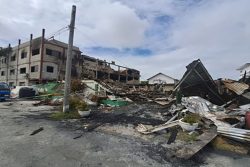Dear Editor,
Your news item, (“PPP urges Canada to stop exporting criminals,” Saturday, October 20), related to the Guyanese family that received political asylum in Canada, last month which captured many people’s attention when it first broke. It is a story that should have died a quick and natural death, because it is no different from stories already being told of many Guyanese who received refugee or asylum status in America in the past ten years.
As with the case in Canada, the cases in America share the same reason for asylum or refugee seekers: fear of losing one’s life in an environment where neither government nor police provide adequate protection (either from politically inspired criminal elements or free-roaming drug-based gunslingers).
But instead of allowing this Canada asylum story to lose its way in the daily humdrum of life in Guyana, the ruling PPP decided to keep it alive to score political points at home by trying to knock Canada for making the PPP regime and its police force look bad.
Who are the ones at Freedom House that came up with this statement challenging Canada ‘to stop exporting criminals’ to Guyana? If anything this particular case has Canada doing for this Guyanese family what the PPP regime failed to do for them (and countless others whose stories have not made it into the local or foreign press).
Never mind the fact that this family’s story was believable enough to convince the Canadian authorities, what has to be more damaging is the fact that the PPP occupies the seat of government with responsibility for ensuring public safety by apprehending criminals (including drug smugglers and money launderers) via its police force, but has failed miserably at fulfilling this responsibility.
And what has to be more distressing is to know there are drug smugglers who ply their illicit trade, launder their ill-gotten gains into front businesses, and even hobnob with government officials at high levels. There seems to be an unsigned agreement between certain government officials and drug mavens, posing as Guyana’s new breed of businessmen.
Yet not once have we ever read a statement from the PPP condemning this relationship of convenience. In fact, when a noted drug baron, who owned several front businesses in Guyana, went public with his claim of helping defeat criminal elements out to overthrow the PPP regime, did we read any statement from the PPP?
That man, now facing serious drug conspiracy charges in New York, even went so far as to accuse the US, the PNC and the GDF of orchestrating a plot to overthrow the PPP regime. Did he fabricate or was he fed such highly disturbing information? Did we ever read a statement from the PPP disassociating itself from this charge? Who facilitated him in his illegal drug and extra-judicial operations?
Can it be that the PPP’s decision to make a public statement on the Canada asylum case is based on the applicants being of Indian extraction, and for Indians to be seen by the world as fleeing Guyana under an Indian-backed PPP government, has to be a worst case scenario which the politically blind leaders of the ruling party are unwilling to publicly accept?
On the other hand, isn’t this case likely to negatively impact the view thousands of Indian Guyanese living in Canada have of the PPP as a government? These are Indian Guyanese who left Guyana during the era of the PNC reign!
It is not that Canada (or America) is not familiar with what is actually happening in Guyana under the PPP regime, but each successful asylum case helps bolster the argument for Canada (or America) in challenging the PPP regime to get its act together immediately: Reform the police force, aggressively implement the anti-narcotics master plan, and deepen the process of democracy beyond the ballot box and a few superficial appointments or freedoms.
Mr Editor, I would be remiss if I did not say that it is true that Guyana, like sister Caricom countries, faces a dilemma with the forced return of Guyanese from overseas after being convicted of drug-related offences. But the problem is not just sourced to the originating countries; it can also be attributed in part to the reaction of receiving countries.
It is now common knowledge that the crisis caused by deported criminals is regional in nature, so instead of countries taking individual approaches to originating countries for redress, would it not be better for receiving countries to collectively draft a feasible proposal and a comprehensive assimilation plan through the Caricom Secretariat for redress by originating countries?
Is there any sort of networking taking place today within the region to help each other minimize the impact of criminal deportees? It is not just about information sharing at law enforcement and behavioural correction levels, but getting feedback on what social programmes are working to ameliorate the situation.
Yours faithfully,
Emile Mervin







